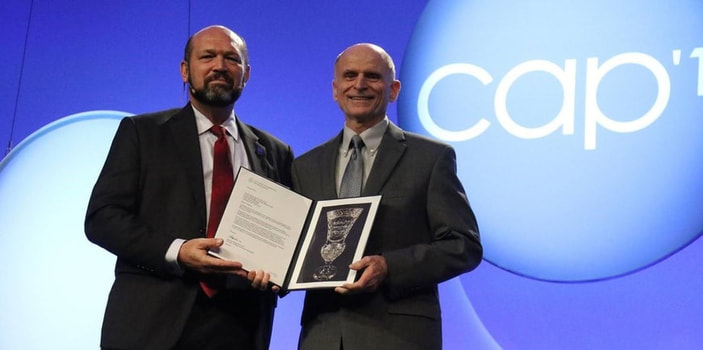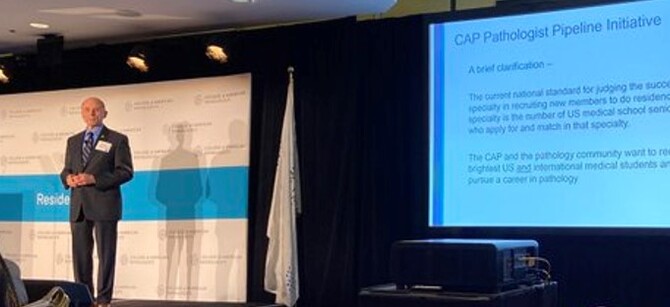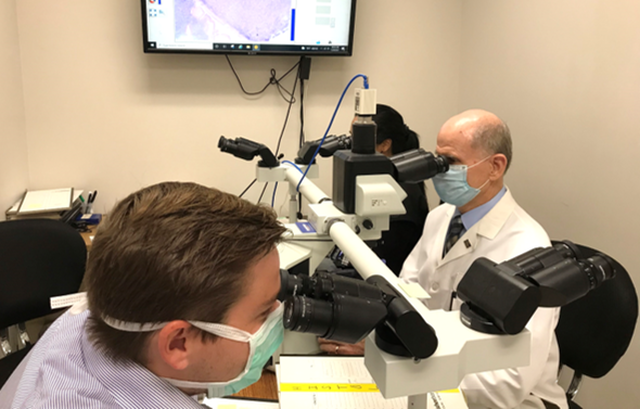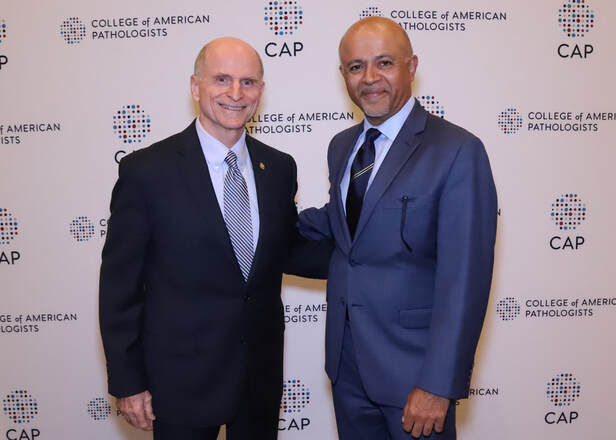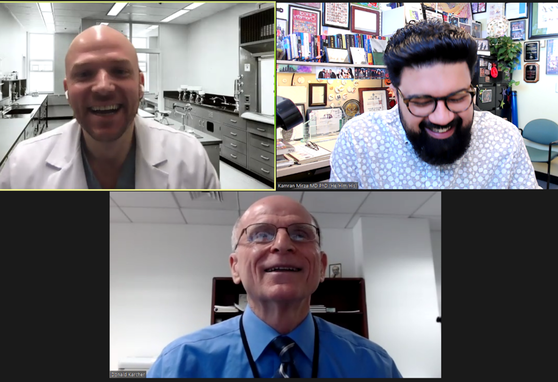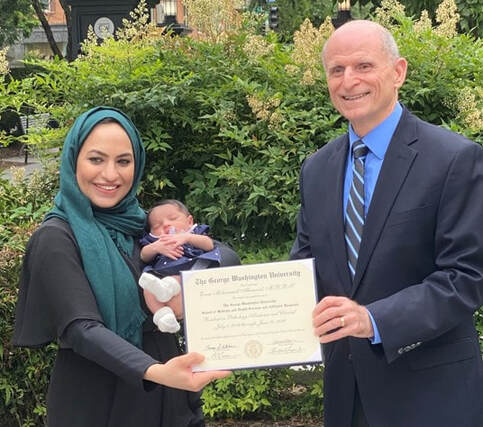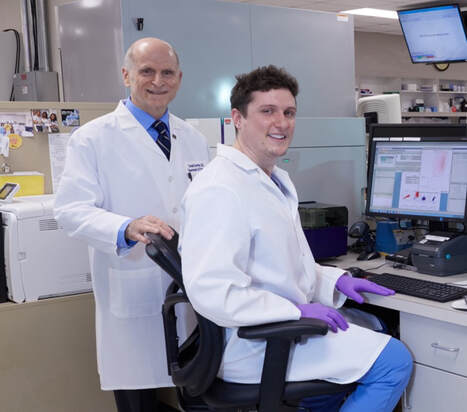
FOR PATHOLOGY - FOR OUR MEMBERS - FOR OUR PATIENTS
Dear Colleagues,
I’m truly honored to serve as President of the CAP. I'd like to express my sincere thanks to my fellow CAP members for electing me and allowing me to serve in this position. It has been a great experience for me to serve as a CAP Governor since 2016. In my long career in military, private, and academic practice, and after serving as an elected leader in the academic pathology community and for many years as an active member and chair of several CAP committees, councils, and other groups, becoming a CAP Governor has allowed me to serve our profession, our members, and our patients in a variety of new ways. In my newest role as President, I pledge to continue to keep all three upmost in everything I do.
A personal statement about pathology, our patients, and my vision for the CAP
Medical and pathology practice are rapidly changing, as the focus on value in healthcare delivery continues and as new technology becomes part of daily practice. Even as the healthcare system evolves, pathology continues to be the foundation of medicine, a point made very clear to many, including patients, during the COVID-19 pandemic.
As an actively practicing pathologist for many years and the father of a breast cancer survivor, I've seen first-hand the amazing value of pathology from both the pathologist’s and the patient’s perspective. This has strongly reinforced for me the importance of pathologists being visible to our patients, our medical colleagues, and society at-large.
As we move forward with confidence in these uncertain times, I want to ensure that . . .
What I will do
As CAP President . . .
(Please see my detailed goals as President below the photos.)
A bit about me
(much more below the photos)
Practice experience
4 examples of current major issues facing pathologists and the CAP
(Please see the full list of issues below the photos.)
1. COVID-19 pandemic
The COVID-19 pandemic has reminded us all how rapidly healthcare can change and how pathology practices and clinical labs can be significantly disrupted by circumstances beyond our control. The pathology community has risen to the challenge and the CAP has been there with us and for us as we've addressed this national emergency. In a world in which medical crises can develop with increasing speed, the CAP must remain nimble and strong to respond quickly when necessary and to provide robust advocacy and support for pathologists, pathology practices, and clinical labs during troubling times.
2. Payment for pathologist services
Payment for pathologists’ services has been an ongoing challenge for the pathology community for many years. Given the great value pathologists bring to patient care, we must be compensated fairly for providing these life-saving services. As the leading advocate for pathologists’ payment, the CAP and its advocacy in this area are of critical importance to our members and to all pathologists, and ultimately to our patients. (Please see my detailed issue statement below on payment for pathologist services and the role of the CAP.)
3. Artificial intelligence (AI)
This emerging technology is evolving quickly and will soon be part of pathology practice. The CAP must lead in preparing pathologists to understand and use this technology and we must advocate strongly for appropriate, non-burdensome oversight by regulatory agencies (FDA, CMS) and fair payment when we employ AI in our practices.
(Please see my detailed issue statement below on artificial intelligence, pathology, and the CAP.)
4. Diversity and inclusion in pathology and the CAP
Pathology is a richly diverse specialty and CAP members are increasingly women, people of color, and pathologists from many different backgrounds and with many different interests. As we happily welcome increasingly diverse colleagues into our organization, it’s essential that the leadership of the CAP matches the membership of the CAP. We must create opportunities for all CAP members to assume leadership roles at all levels in the CAP.
(Please see my detailed issue statement below on diversity and inclusion in pathology and the CAP.)
Issue statements
Payment for pathologist services and the role of the CAP
The issue
Pathologists must be fairly paid for the critically important clinical services we provide. This is the only way to ensure that patients continue to have access to these life-saving services. In the era of cost-cutting and value-based health care, payment of pathologists is currently at greater risk than at any time in the recent past. Fee-for-service payments for pathologists by both governmental and private payers are constantly being adjusted downward, and value-based payment models (MIPS, ACOs, bundled payments, etc.) are expanding. In addition, payments for physicians who use E&M codes to bill for their services are currently being increased by CMS, at the expense of pathologists and other specialists. And coverage for certain pathology services is frequently limited by Medicare Administrative Contractors (MACs) as part of the Medicare local coverage determination (LCD) process. As the leading advocate for fair payment and appropriate coverage for pathologists’ services, and as the only 501(c)(6) organization among the national pathology societies, the CAP is THE key organization in support of pathologist compensation. CAP advocacy in this area has been very successful over the years, but today’s payment challenges will require even greater focus.
What I've done so far
I served as a member of the CAP Council on Government and Professional Affairs (CGPA) for 10 years and served as both Vice Chair and Chair of this key group. Over that time, I helped develop and lead the CAP’s advocacy on payment issues for pathologists and clinical laboratories. As part of this work, I led advocacy efforts with both governmental and private payers and met directly with leaders in CMS and private insurance companies on payment issues. I also met directly with leaders of MACs (e.g. Palmetto GBA) to resolve coverage issues for pathology and clinical lab services. For many years, I led the CAP's advocacy regarding ACOs and other value-based payment models.
What I will do as President
I will do everything I can to ensure that the CAP . . .
Artificial intelligence, pathology, and the CAP
The issue
Artificial intelligence (AI) is developing quickly and will significantly impact both AP and CP practice. From AI-based digital image analysis in AP to AI-driven clinical decision support algorithms using clinical lab data in CP, pathologists will soon be using AI in their daily work. Pathologists need to embrace this emerging technology, as it will help us make deeper, richer diagnoses and deliver more detailed and actionable clinical lab services. It has been clearly shown that pathology AI tools need the involvement and careful oversight of pathologists to function correctly. To prepare for this revolution, it’s very important that pathologists understand how AI works, what AI tools are already here and coming in the future, and how to select, validate, use, and monitor AI-based programs. It’s also critically important that these tools are regulated appropriately by the government and that pathologists are paid fairly for using and overseeing these complex systems in our practice.
What I've done so far
I served as a founding member of the CAP AI Committee and Information Technology Leadership Committee and I've worked over the past 5 years on multiple regulatory and educational issues related to AI. Among other things, I met directly with FDA officials to discuss appropriate regulatory oversight of pathology AI tools. As an AI Committee member and past Chair of the CAP Council on Education, I helped oversee development of the CAP's overall AI strategy and creation of multiple AI educational resources for pathologists.
What I will do as President
I will do everything I can to ensure that the CAP . . .
Diversity and inclusion in pathology and the CAP
The issue
One of the great strengths of pathology as a specialty is that pathologists are increasingly diverse in all the ways that one can define diversity: by age, gender, gender identity, marital and family status, race, country of origin, location of medical school education, subspecialty interest, practice focus, outside interests, etc. We welcome ALL into our specialty! But we haven’t always made everyone feel equally comfortable as a member or leader in the CAP. This must change ASAP! The CAP has developed an initiative to increase diversity and inclusion among our membership and leadership. A CAP committee – the Diversity, Equity, and Inclusion (DEI) Committee – is currently working on many diversity-focused membership and operational changes. The committee is helping guide the CAP as we strive to remove barriers and achieve full diversity at all levels. In the end, maximizing diversity in the CAP will make us a better, stronger, and more effective organization.
What I’ve done so far
As a CAP Governor, chair of two CAP councils and multiple CAP committees, and member of many other CAP committees, I’ve strongly supported the ongoing CAP diversity initiative from the beginning. I helped to populate the CAP DEI Committee with members and looked at ways the committee can help guide our efforts to achieve full diversity. But even before this committee was proposed or approved, I had already started introducing new procedures to expand diversity in the CAP groups that I influence. As an example, I instituted a new transparent and inclusive process for appointing vice chairs and chairs of the CAP committees that report to the councils I chair. We know that being a committee vice chair or chair is often the first step toward higher leadership positions in the CAP. Having increasingly diverse vice chairs and chairs moving up the leadership ladder will definitely help the CAP leadership to eventually match our wonderfully diverse CAP membership.
What I will do as President
I will do everything I can to ensure that the CAP . . .
Key examples of my past work in the CAP and beyond
(Please see the full list below the photos.)
CAP Board, Executive Committee, Finance Committee, Audit Committee, Constitution/Bylaws Committee, and IT Leadership Committee - As a member of the Board of Governors and these key Board committees, I've worked hard to keep the CAP strategically focused, operationally effective, and fiscally sound.
Chair (for 2 years), Vice Chair (for 1 year), and Member (for 10 years), CAP Council on Government and Professional Affairs - As a CGPA member and leader for 10 years, I've helped lead the CAP's advocacy efforts, at the federal and state levels, to protect payment for pathology and lab services (by both government and private payers), maintain a favorable regulatory environment for pathologists and clinical labs, protect pathologists' scope-of-practice, and keep pathologists at the cutting edge in the use of emerging technology in daily practice.
Chair, CAP Council on Education - As current COE Chair, I'm working with fellow CAP members and the CAP Learning and Publications Departments to ensure that CAP educational activities are the best available for pathologists in all practice settings and that CAP journals and publications provide essential information for clinical and research excellence, practice success, and quality clinical lab services.
Chair, Pathologist Pipeline Ad Hoc Committee - I'm currently leading a new CAP initiative, involving multiple CAP councils, the Resident Forum, and the House of Delegates, to increase the visibility of pathology as an exciting and rewarding medical specialty and to attract more of the best and brightest medical students and graduates, both US and international, to choose a career in pathology.
Workforce and new-in-practice pathologists - As a member of the CAP Pathology Workforce/GME Workgroup, I'm working to help maintain an adequate pathology workforce, improve the effectiveness of pathology residency training, and help new-in-practice pathologists to be prepared for successful practice.
Value-based care and pathologists - For many years, I've helped lead the CAP's efforts to help pathologists succeed under the expanding value-based care and payment models (MACRA, MIPS, ACOs, bundled payments, etc.).
Informatics and artificial intelligence - I’ve worked for many years in the CAP and other organizations on laboratory informatics-related advocacy, educational, and operational activities. I'm a member of the CAP IT Leadership Committee and Artificial Intelligence Committee and currently working on emerging new informatics aspects of pathology practice, including artificial intelligence/machine learning tools.
Academic and medical educational issues - As an academic pathologist, department chair for 20 years, residency program director for 12 years, and Past President of the Association of Pathology Chairs, I’ve worked extensively on academic pathology and educational issues and am continuing to provide effective liaison between the CAP and the academic pathology community.
Please scroll past the photos to learn more about my experience, the many issues facing pathologists and the CAP, and my detailed goals as CAP President-Elect and President.
Dear Colleagues,
I’m truly honored to serve as President of the CAP. I'd like to express my sincere thanks to my fellow CAP members for electing me and allowing me to serve in this position. It has been a great experience for me to serve as a CAP Governor since 2016. In my long career in military, private, and academic practice, and after serving as an elected leader in the academic pathology community and for many years as an active member and chair of several CAP committees, councils, and other groups, becoming a CAP Governor has allowed me to serve our profession, our members, and our patients in a variety of new ways. In my newest role as President, I pledge to continue to keep all three upmost in everything I do.
A personal statement about pathology, our patients, and my vision for the CAP
Medical and pathology practice are rapidly changing, as the focus on value in healthcare delivery continues and as new technology becomes part of daily practice. Even as the healthcare system evolves, pathology continues to be the foundation of medicine, a point made very clear to many, including patients, during the COVID-19 pandemic.
As an actively practicing pathologist for many years and the father of a breast cancer survivor, I've seen first-hand the amazing value of pathology from both the pathologist’s and the patient’s perspective. This has strongly reinforced for me the importance of pathologists being visible to our patients, our medical colleagues, and society at-large.
As we move forward with confidence in these uncertain times, I want to ensure that . . .
- pathologists are recognized and fairly rewarded for the great value we bring to individual patients and the entire healthcare system,
- pathology practices - small and large, private and academic - are sustained and given the tools they need to succeed in the rapidly evolving healthcare marketplace,
- the CAP, our wonderfully dynamic and diverse organization, remains a strong advocate for our profession, maximally useful resource for our members, and effective partner as we provide the best possible care for our patients, and
- we keep our focus, as an organization of pathologists, clearly on our patients in everything we do.
What I will do
As CAP President . . .
- Work closely with CAP members, leaders, and staff on a daily basis to ensure a timely response to any and all challenges
- Complete the work to bring full diversity and inclusion to the CAP membership and all levels of CAP leadership
- Make sure the CAP continues to advocate strongly on the full range of issues (payment, regulation, scope-of-practice, etc.) important to pathologists and clinical labs
- Ensure that CAP educational resources are top-quality, innovative in delivery, readily accessible (particularly electronically and on mobile devices), affordable, and focused on the knowledge and evolving skills needed by today’s pathologists in all practice settings and at all stages of our career
- Support, strengthen, and work closely with state and local pathology societies
- Reinforce the CAP's role as the standard setter in pathology and clinical lab quality and provider of innovative lab accreditation services and user-friendly proficiency testing products
- Help bring the CAP closer to our members, with frequent town hall webinars for CAP leaders and members throughout the year, support of the CAP mobile app, continuous upgrading of the CAP website, and other effective member resources and benefits
(Please see my detailed goals as President below the photos.)
A bit about me
(much more below the photos)
Practice experience
- Full-time practicing AP-CP pathologist and hematopathologist
- First in military practice, then private community hospital practice, more recently (and currently) in academic practice
- Past leader in my private community hospital practice group
- CLIA lab director x 26 years (including private lab and large academic lab)
- Department chair x 20 years at George Washington University Medical Center in Washington, DC
- Pathology residency program director x 12 years
- Served in 2014-2016 as President, Association of Pathology Chairs (presidential leadership cycle 2012-2018)
- Leader in multiple other academic organizations
- President, 2023-2025
- HOD delegation chair x 5 years
- Board of Governors x 5 years
- Chair of 2 key CAP councils (Council on Government and Professional Affairs and Council on Education)
- Longtime member of CAP Executive Committee, Finance Committee, and multiple other Board committees
- Member/chair of 20 additional CAP committees and work groups
- Appeared twice on CNN as a pathologist
- Appeared in over 60 other live television and radio interviews
- Interviewed by the New York Times
- Featured in front page story in the Washington Post
- Quoted in many other press articles about pathology and laboratory medicine
4 examples of current major issues facing pathologists and the CAP
(Please see the full list of issues below the photos.)
1. COVID-19 pandemic
The COVID-19 pandemic has reminded us all how rapidly healthcare can change and how pathology practices and clinical labs can be significantly disrupted by circumstances beyond our control. The pathology community has risen to the challenge and the CAP has been there with us and for us as we've addressed this national emergency. In a world in which medical crises can develop with increasing speed, the CAP must remain nimble and strong to respond quickly when necessary and to provide robust advocacy and support for pathologists, pathology practices, and clinical labs during troubling times.
2. Payment for pathologist services
Payment for pathologists’ services has been an ongoing challenge for the pathology community for many years. Given the great value pathologists bring to patient care, we must be compensated fairly for providing these life-saving services. As the leading advocate for pathologists’ payment, the CAP and its advocacy in this area are of critical importance to our members and to all pathologists, and ultimately to our patients. (Please see my detailed issue statement below on payment for pathologist services and the role of the CAP.)
3. Artificial intelligence (AI)
This emerging technology is evolving quickly and will soon be part of pathology practice. The CAP must lead in preparing pathologists to understand and use this technology and we must advocate strongly for appropriate, non-burdensome oversight by regulatory agencies (FDA, CMS) and fair payment when we employ AI in our practices.
(Please see my detailed issue statement below on artificial intelligence, pathology, and the CAP.)
4. Diversity and inclusion in pathology and the CAP
Pathology is a richly diverse specialty and CAP members are increasingly women, people of color, and pathologists from many different backgrounds and with many different interests. As we happily welcome increasingly diverse colleagues into our organization, it’s essential that the leadership of the CAP matches the membership of the CAP. We must create opportunities for all CAP members to assume leadership roles at all levels in the CAP.
(Please see my detailed issue statement below on diversity and inclusion in pathology and the CAP.)
Issue statements
Payment for pathologist services and the role of the CAP
The issue
Pathologists must be fairly paid for the critically important clinical services we provide. This is the only way to ensure that patients continue to have access to these life-saving services. In the era of cost-cutting and value-based health care, payment of pathologists is currently at greater risk than at any time in the recent past. Fee-for-service payments for pathologists by both governmental and private payers are constantly being adjusted downward, and value-based payment models (MIPS, ACOs, bundled payments, etc.) are expanding. In addition, payments for physicians who use E&M codes to bill for their services are currently being increased by CMS, at the expense of pathologists and other specialists. And coverage for certain pathology services is frequently limited by Medicare Administrative Contractors (MACs) as part of the Medicare local coverage determination (LCD) process. As the leading advocate for fair payment and appropriate coverage for pathologists’ services, and as the only 501(c)(6) organization among the national pathology societies, the CAP is THE key organization in support of pathologist compensation. CAP advocacy in this area has been very successful over the years, but today’s payment challenges will require even greater focus.
What I've done so far
I served as a member of the CAP Council on Government and Professional Affairs (CGPA) for 10 years and served as both Vice Chair and Chair of this key group. Over that time, I helped develop and lead the CAP’s advocacy on payment issues for pathologists and clinical laboratories. As part of this work, I led advocacy efforts with both governmental and private payers and met directly with leaders in CMS and private insurance companies on payment issues. I also met directly with leaders of MACs (e.g. Palmetto GBA) to resolve coverage issues for pathology and clinical lab services. For many years, I led the CAP's advocacy regarding ACOs and other value-based payment models.
What I will do as President
I will do everything I can to ensure that the CAP . . .
- Continues to advocate strongly for fair fee-for-service payment for all pathology services by both governmental and private payers
- Works hard to oppose and mitigate the proposed across-the-board cut in Medicare payments for pathologists as part of the ongoing E&M code re-valuation
- Advocates for the best possible payment for and least administrative burden on pathologists as value-based payment models expand
- Preserves and expands the CAP’s CMS Qualified Clinical Data Registry (the Pathologists Quality Registry) to help pathologists maximize Medicare payments under MIPS
- Monitors the Medicare LCD process and works with CMS and directly with MACs to preserve coverage for pathology services
- Works closely with state pathology societies on state-level billing, payment, and provider network issues
Artificial intelligence, pathology, and the CAP
The issue
Artificial intelligence (AI) is developing quickly and will significantly impact both AP and CP practice. From AI-based digital image analysis in AP to AI-driven clinical decision support algorithms using clinical lab data in CP, pathologists will soon be using AI in their daily work. Pathologists need to embrace this emerging technology, as it will help us make deeper, richer diagnoses and deliver more detailed and actionable clinical lab services. It has been clearly shown that pathology AI tools need the involvement and careful oversight of pathologists to function correctly. To prepare for this revolution, it’s very important that pathologists understand how AI works, what AI tools are already here and coming in the future, and how to select, validate, use, and monitor AI-based programs. It’s also critically important that these tools are regulated appropriately by the government and that pathologists are paid fairly for using and overseeing these complex systems in our practice.
What I've done so far
I served as a founding member of the CAP AI Committee and Information Technology Leadership Committee and I've worked over the past 5 years on multiple regulatory and educational issues related to AI. Among other things, I met directly with FDA officials to discuss appropriate regulatory oversight of pathology AI tools. As an AI Committee member and past Chair of the CAP Council on Education, I helped oversee development of the CAP's overall AI strategy and creation of multiple AI educational resources for pathologists.
What I will do as President
I will do everything I can to ensure that the CAP . . .
- Implements the CAP's comprehensive AI strategy that covers all aspects of AI's impact on AP and CP practice and on the CAP itself
- Works closely with the FDA, CMS, and other governmental agencies on appropriate and non-burdensome regulatory oversight of AI tools
- Advocates with CMS and private payers to maintain fair payment of pathologists for our use of AI tools and our critically important oversight of these complex systems
- Creates a range of AI educational and practice management resources for pathologists that are practical, “hand-on” in design, and readily accessible (including online and on mobile devices)
Diversity and inclusion in pathology and the CAP
The issue
One of the great strengths of pathology as a specialty is that pathologists are increasingly diverse in all the ways that one can define diversity: by age, gender, gender identity, marital and family status, race, country of origin, location of medical school education, subspecialty interest, practice focus, outside interests, etc. We welcome ALL into our specialty! But we haven’t always made everyone feel equally comfortable as a member or leader in the CAP. This must change ASAP! The CAP has developed an initiative to increase diversity and inclusion among our membership and leadership. A CAP committee – the Diversity, Equity, and Inclusion (DEI) Committee – is currently working on many diversity-focused membership and operational changes. The committee is helping guide the CAP as we strive to remove barriers and achieve full diversity at all levels. In the end, maximizing diversity in the CAP will make us a better, stronger, and more effective organization.
What I’ve done so far
As a CAP Governor, chair of two CAP councils and multiple CAP committees, and member of many other CAP committees, I’ve strongly supported the ongoing CAP diversity initiative from the beginning. I helped to populate the CAP DEI Committee with members and looked at ways the committee can help guide our efforts to achieve full diversity. But even before this committee was proposed or approved, I had already started introducing new procedures to expand diversity in the CAP groups that I influence. As an example, I instituted a new transparent and inclusive process for appointing vice chairs and chairs of the CAP committees that report to the councils I chair. We know that being a committee vice chair or chair is often the first step toward higher leadership positions in the CAP. Having increasingly diverse vice chairs and chairs moving up the leadership ladder will definitely help the CAP leadership to eventually match our wonderfully diverse CAP membership.
What I will do as President
I will do everything I can to ensure that the CAP . . .
- Strongly supports the DEI Committee and gives the committee the support and resources it needs to effectively do its work
- Strongly considers all recommendations from the DEI Committee to increase diversity and promote inclusion among CAP members and leaders
- Continues to increase transparency and fairness in the process to appoint members to CAP committees and councils
- Utilizes a maximally transparent and inclusive process to appoint vice chairs and chairs of all CAP committees
- Works to remove barriers for members to serve on CAP committees, assume leadership positions (including elected leadership positions), and participate fully in everything the CAP has to offer. An example would be to increase the member- and family-friendliness of CAP national meetings, educational activities, and travel related to committee, council, and Board meetings.
Key examples of my past work in the CAP and beyond
(Please see the full list below the photos.)
CAP Board, Executive Committee, Finance Committee, Audit Committee, Constitution/Bylaws Committee, and IT Leadership Committee - As a member of the Board of Governors and these key Board committees, I've worked hard to keep the CAP strategically focused, operationally effective, and fiscally sound.
Chair (for 2 years), Vice Chair (for 1 year), and Member (for 10 years), CAP Council on Government and Professional Affairs - As a CGPA member and leader for 10 years, I've helped lead the CAP's advocacy efforts, at the federal and state levels, to protect payment for pathology and lab services (by both government and private payers), maintain a favorable regulatory environment for pathologists and clinical labs, protect pathologists' scope-of-practice, and keep pathologists at the cutting edge in the use of emerging technology in daily practice.
Chair, CAP Council on Education - As current COE Chair, I'm working with fellow CAP members and the CAP Learning and Publications Departments to ensure that CAP educational activities are the best available for pathologists in all practice settings and that CAP journals and publications provide essential information for clinical and research excellence, practice success, and quality clinical lab services.
Chair, Pathologist Pipeline Ad Hoc Committee - I'm currently leading a new CAP initiative, involving multiple CAP councils, the Resident Forum, and the House of Delegates, to increase the visibility of pathology as an exciting and rewarding medical specialty and to attract more of the best and brightest medical students and graduates, both US and international, to choose a career in pathology.
Workforce and new-in-practice pathologists - As a member of the CAP Pathology Workforce/GME Workgroup, I'm working to help maintain an adequate pathology workforce, improve the effectiveness of pathology residency training, and help new-in-practice pathologists to be prepared for successful practice.
Value-based care and pathologists - For many years, I've helped lead the CAP's efforts to help pathologists succeed under the expanding value-based care and payment models (MACRA, MIPS, ACOs, bundled payments, etc.).
Informatics and artificial intelligence - I’ve worked for many years in the CAP and other organizations on laboratory informatics-related advocacy, educational, and operational activities. I'm a member of the CAP IT Leadership Committee and Artificial Intelligence Committee and currently working on emerging new informatics aspects of pathology practice, including artificial intelligence/machine learning tools.
Academic and medical educational issues - As an academic pathologist, department chair for 20 years, residency program director for 12 years, and Past President of the Association of Pathology Chairs, I’ve worked extensively on academic pathology and educational issues and am continuing to provide effective liaison between the CAP and the academic pathology community.
Please scroll past the photos to learn more about my experience, the many issues facing pathologists and the CAP, and my detailed goals as CAP President-Elect and President.
Photo Legends
1. Receiving 2015 Pathologist of the Year Award from CAP President Dr. Richard Friedberg
2. Making lab rounds in early 2020 with GW pathology residents
3. Speaking at CAP Resident Forum meeting in February, 2020
4. At CAP 19 with Congresswoman and former HHS Secretary Donna Shalala, a great friend of the CAP
5. Hematopathology sign-out in 2021 with GW resident and medical student
6. Welcoming Dr. Abraham Verghese, noted physician and author, as keynote
speaker at CAP 17
7. At Association of Indian Pathologists in North America meeting
with Lois and former resident and great friend Dr. Ritu Nayar
8. Recording Zoom podcast in 2021 on the pathologist pipeline
9. Celebrating with a recent GW residency graduate and her daughter
10. In the GW Flow Lab with our lead technologist
11. Helping lead a CAP CGPA meeting with Dr. Jon Myles in 2019
12. With friends at the 2020 USCAP meeting in Los Angeles
13. Don and Lois with 5 of our 7 grandkids
Below are details about my career, my current and past activities in the CAP and other organizations, important issues facing pathologists and the CAP, and the full list of my goals as CAP President.
CURRENT POSITION
Professor (Tenured) and Immediate Past Chair of Pathology (Chair 1999-2019)
Full-time practicing hematopathologist and director of the Flow Cytometry Laboratory
George Washington University Medical Center
Washington, DC
EDUCATION AND BOARD CERTIFICATION
- Medical School – Louisiana State University School of Medicine, New Orleans
- Internship and Residency – Brooke Army Medical Center, Fort Sam Houston, Texas.
- Board Certification - Anatomic and Clinical Pathology, Hematopathology
RECENT AWARDS AND HONORS
- CAP Pathologist of the Year - 2015
- CAP President’s Honors - 2013, 2019, 2020, 2022
PROFESSIONAL SOCIETY MEMBERSHIPS
- College of American Pathologists
- American Medical Association
- Association of Pathology Chairs
- American Society for Clinical Pathology
- United States and Canadian Academy of Pathology
- California Society of Pathologists
- Florida Society of Pathologists
- Texas Society of Pathologists
- Chinese American Pathologists Association
- Association of Indian Pathologists in North America
- Society for Hematopathology
- American Society for Investigative Pathology
- Academy of Medicine of Washington, DC
CAP BOARD, COUNCIL, HOUSE OF DELEGATES, AND COMMITTEE SERVICE
- President-Elect (2021-2023); President (2023-2025)
- Member, Board of Governors (2016-present)
- Member, Board Executive Committee (2017-present)
- Member, Board Finance Committee
- Member, Board Audit Committee
- Member, Board Constitution and Bylaws Committee
- Member, Board Information Technology Leadership Committee
- Member, Board Artificial Intelligence Committee
- Chair, Council on Government and Professional Affairs (CGPA)
- Chair, Council on Education (COE)
- Chair, DC Delegation, House of Delegates
- Chair, Pathologist Pipeline Ad Hoc Committee
- Chair, ACO Network
- Chair, ACO Steering Committee
- Chair, Value-Based Care Strategy Steering Group
- Co-Chair, CAP/APC/API Informatics Curriculum Core Team (developed national PIER informatics curriculum for pathology residents)
- Vice Chair, Annual Meeting Strategy Execution Steering Committee
- Vice Chair, Council on Government and Professional Affairs
- Vice Chair, Council on Education
- Member, Artificial Intelligence Project Team
- Member, Specialty Advancement Coordinating Group
- Member, Pathology Workforce/GME Workgroup
- Member, Policy Roundtable Steering Committee
- Member, Council on Government and Professional Affairs
- Member, Engaged Leaders Network
- Member, PathNET
- Member, Executive Advisory Board, Archives of Pathology and Laboratory Medicine
- Member, DIHIT/CGPA Health Information Technology (HIT) Policy Workgroup
- Member, ACO-HIT Workgroup
- Member, Enterprise Strategy for Informatics Advisory Group
- Member, TPOSC Module III: Practice Models and Economics Workgroup
- Member, OPPE-FPPE Task Force
- Member, Quality Practices Committee
- Alternate Delegate to AMA HOD, representing CAP
- CAP Representative to Pathology Roundtable (Moderator, Pathology Roundtable)
- CAP Representative to ACO Learning Collaborative (formerly Brookings/Dartmouth ACO Learning Network)
CAP PUBLISHING AND EDUCATIONAL ACTIVITIES
- Co-Editor and author, 2nd Edition (2019) of CAP publication Laboratory Administration for Pathologists
- Author, advocacy chapter, CAP 75th anniversary history book (published in 2021)
- CAP Annual Meeting Faculty – 2011-2019 (total of 17 courses and workshops)
- CAP Policy Meeting Faculty – 2011, 2012, 2014, 2015, 2018, 2019
- CAP House of Delegates Meeting Faculty – 2012 (Spring and Fall meetings), 2013, 2018 (Spring and Fall meetings), 2019 (Spring and Fall meetings), 2020, 2021
- CAP Resident Forum Faculty – 2013, 2014, 2016, 2017, 2018, 2019, 2020
- CAP Webinars – 2013-2021 (16 webinars)
- CAP Podcasts - 2015-2020 (5 podcasts)
LEADERSHIP AND SERVICE IN OTHER PROFESSIONAL ORGANIZATIONS
- Association of Pathology Chairs (APC): President in 2014-2016 (presidential leadership cycle ended 2018); Council (Board) Member; Councilor-at-Large; Chair, Advocacy Committee; Chair, HIT Committee; Member, GME Committee; Member, Practice and Management Committee
- Intersociety Council for Pathology Information (ICPI): Board Member, Board Chair
- International Collaborative of Pathologists: Founding Board Member
- American Board of Pathology (ABPath): Member, Test Development and Advisory Committee (Lab Management and Informatics)
- American Medical Association, Alternate Delegate to AMA HOD, representing CAP
- Pathology Roundtable: Moderator and CAP Representative
- Editorial Board (current), Academic Pathology
- Editorial Board (current), Journal of Clinical and Translational Pathology
- Editorial Board (current), Health and Medical Informatics
- Accreditation Council for Graduate Medical Education (ACGME): Advisor, Clinical Informatics Fellowship Program Requirements; Advisor, Clinical Informatics Fellowship Milestones
- Association of American Medical Colleges (AAMC): Member, Group on Educational Affairs; Member, Council of Faculty and Academic Societies (CFAS); Member, CFAS Leadership Development Committee; Member, CFAS Nominating Committee; Member, CFAS Advocacy Task Force; Member, CFAS Value Proposition Working Group
- Accountable Care Organization (ACO) Learning Collaborative (formally Brookings-Dartmouth ACO Learning Network): Principle CAP Representative (as Chair of the CAP ACO Network)
- National Pathology Workforce Summit (co-sponsored by CAP, APC, ASCP, and USCAP): Member, Steering Committee; Member, MD Survey Task Force
- Universities Associated for Research and Education in Pathology: Board Member
- American Society for Investigative Pathology (ASIP): Member, Education Committee
- District of Columbia Department of Health: Appointed by DC Mayor and currently serving as Commissioner and Member, Advisory Committee on Clinical Laboratory Practitioners
- Academy of Medicine of Washington, DC: Elected Member
Major issues facing pathologists and the CAP
- COVID-19 and its impact on laboratory testing, pathology practice, and the entire healthcare system - The CAP must continue to lead the pathology, clinical laboratory, and greater healthcare communities in guiding and advocating for testing for COVID-19 infection and surveillance, and must help pathologists and their practices weather the current crisis. The CAP must work with the greater clinical laboratory community, the CDC, and with other agencies to be prepared for future similar emergencies.
- Diversity and inclusion in the CAP - The CAP must provide opportunities for women, people of color, and pathologists from all backgrounds to assume leadership positions at all levels in the organization.
- Continuing payment and coverage challenges - The CAP must remain vigilant and continue to advocate strongly for fair payment and full coverage for the critical diagnostic, consultative, and laboratory directorship services we provide.
- Federal, state, and local regulatory challenges – The CAP must continue to protect pathologists and clinical labs from excessive regulatory controls at all levels.
- Challenges to pathologists' scope-of-practice - The CAP must prevent other physicians and/or laboratorians from taking over services (both traditional and newly-emerging) that are more appropriate for pathologists to perform.
- Value-based care and payment models – The CAP must continue to help its members to succeed under the expanding value-based care and payment models, including the Merit-Based Incentive Payment System (MIPS), as part of MACRA, and ACOs, bundled payments, and other alternative payment models.
- Opportunities and risks related to artificial intelligence and other emerging technologies – The CAP must help ensure that pathologists continue to lead in the development and use of emerging diagnostic and clinical management technologies (e.g. artificial intelligence, digital pathology, genomics, etc.)
- Pathologist workforce issues – The CAP must closely monitor the balance between the supply of pathologists and the demand for pathologist services (both traditional and newly-emerging) and be prepared to strongly and quickly address any imbalance. Given recent recruitment statistics, the CAP must work to encourage more US and international medical students and graduates to choose pathology as a career. The CAP must also advocate for adequate federal support for pathology graduate medical education. Finally, the CAP must do all it can to ensure that all pathologists keep a sense of wellness in their professional lives.
- Increasing competition in the proficiency testing and clinical lab accreditation marketplace - The CAP must continue to provide top quality proficiency testing materials and develop customer-friendly, electronically-based reporting methodology for proficiency testing results. The CAP must also continue to streamline the accreditation process and remain the leading provider of clinical lab accreditation.
- CAP organizational challenges and opportunities – The CAP must continue to optimize its systems (particularly its information systems and the CAP website) and strengthen its focus to address the challenges facing the pathology community and to take full advantage of available domestic and increasingly global opportunities. In addition, the CAP must carefully manage its financial resources to ensure that it can continue to effectively fulfill its many missions.
My detailed goals as CAP President
- Help the CAP maintain its leadership of the clinical lab community in the national response to the COVID-19 pandemic, assist and support pathologists and their practices as they recover from the pandemic, and prepare the CAP and the entire clinical laboratory community for any future similar emergencies
- Complete the work to bring full diversity and inclusion to all levels of CAP leadership; make committee and council membership and other CAP activities more member- and family-friendly
- Bring the CAP closer to our members, with frequent town hall webinars for all members, development of a CAP mobile app, and other new member resources
- Encourage more pathologists to become CAP members and provide all CAP members with effective support throughout their career
- Provide pathology practices - small and large, private and academic - with the tools they need to succeed in the rapidly evolving healthcare marketplace
- Support, strengthen, and work closely with all state and local pathology societies
- Ensure that pathologists' payment and scope-of-practice are protected and appropriately maintained
- Protect pathologists and clinical labs from unnecessary and/or burdensome regulations
- Keep the CAP as the advocacy leader of the pathology community, involve more CAP members in advocacy for our profession, and encourage our members to strongly support PathPAC
- Ensure that the CAP remains the leading provider of innovative and accessible educational resources for ALL practicing pathologists
- Enable pathologists and pathology practices to succeed and thrive under the emerging value-based health care delivery and payment models
- Keep pathologists at the cutting edge in the use of emerging technologies (e.g. artificial intelligence, digital pathology, genomics, etc.) and ensure appropriate regulatory oversight and fair payment as we use these technologies in our practice
- Maintain an appropriate balance between the supply of and demand for pathologists and ensure that the next generation of pathologists is well-prepared for the modern practice of pathology
- Encourage more medical students and graduates, both US and international, to choose pathology as a career
- Help all pathologists keep a sense of wellness in their professional lives
- Strongly support the CAP Foundation as it provides life-saving services for medically underserved patients and needed educational resources for US and international pathologists and pathology trainees
- Continue to strengthen cooperation and collaboration between the CAP and the academic pathology community
- Ensure that the CAP continues as the market leader in providing innovative accreditation and user-friendly proficiency testing systems for clinical labs, both domestically and internationally
- Help the CAP optimize its systems, particularly its information systems and the CAP website
- Ensure that the CAP remains financially stable
- Keep the CAP as the leading advocate and quality standard setter for pathologists and clinical labs, a valuable resource for all CAP members, and an effective partner as we provide the best possible services for our patients
As a member organization, all CAP activities must strongly support, directly or indirectly, the needs of CAP members.
I'm truly honored to serve as CAP President!
Best regards,
Don
I'd very much like to hear from you and answer any questions you might have. My email address is [email protected]. I'd also be happy to talk with you by telephone.
Please follow me on X (formerly known as Twitter); my X handle is @DonKarcherMD.
